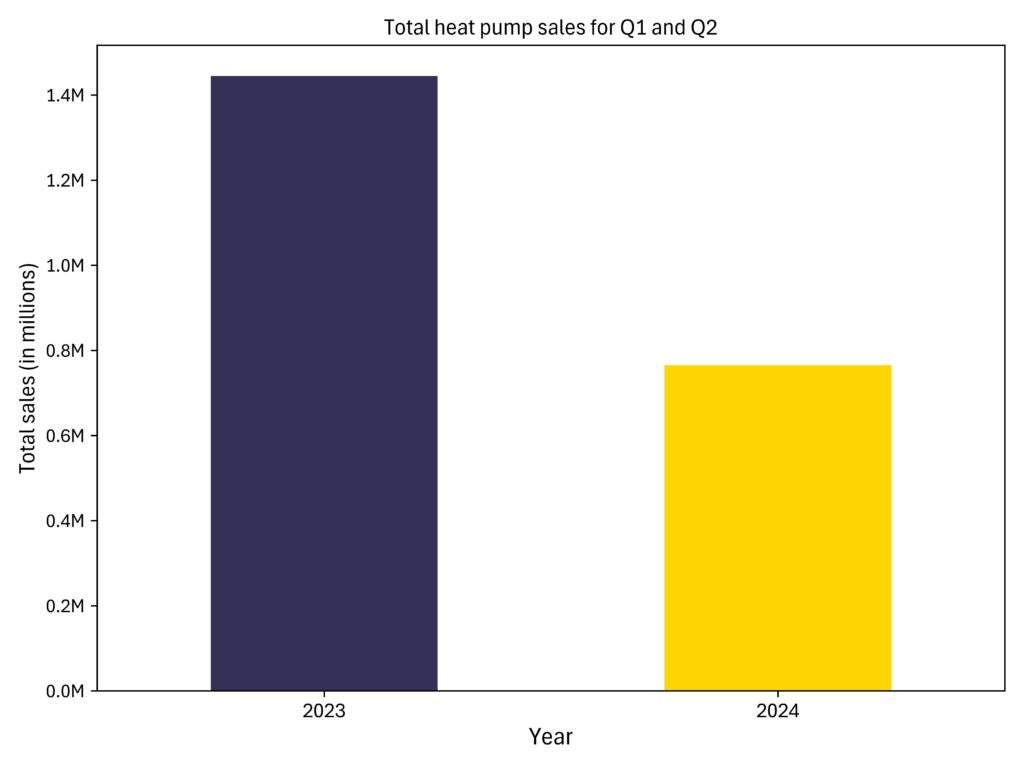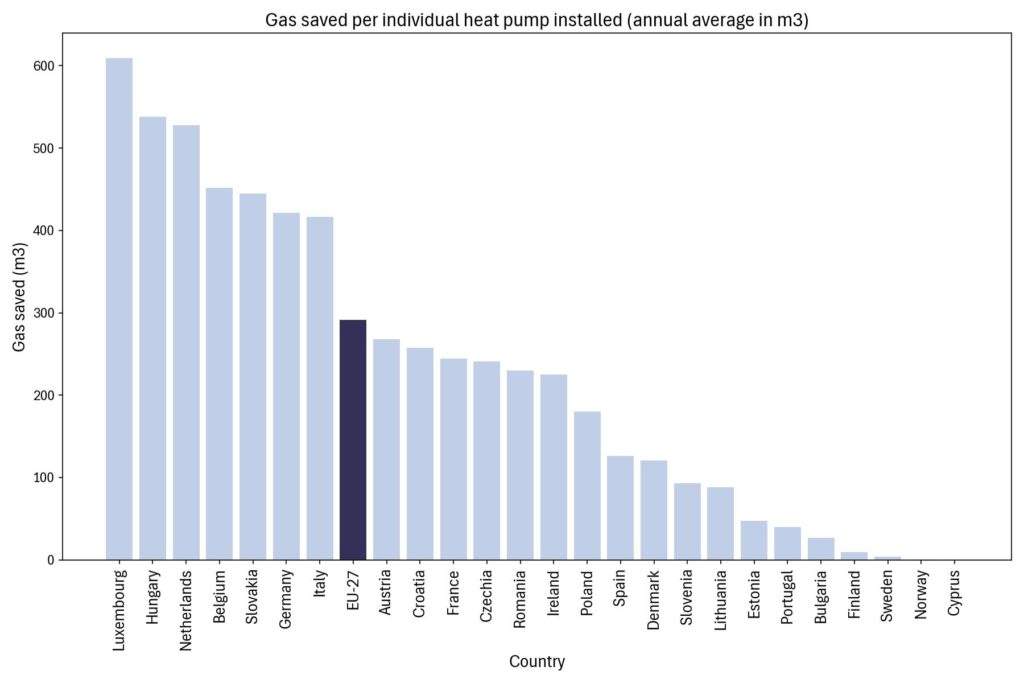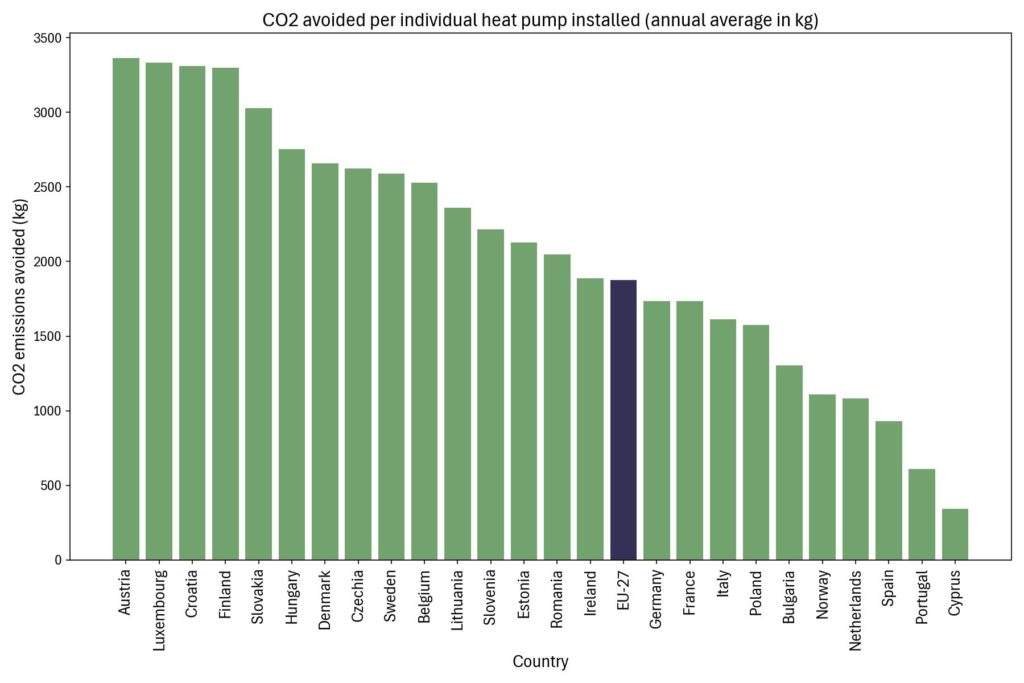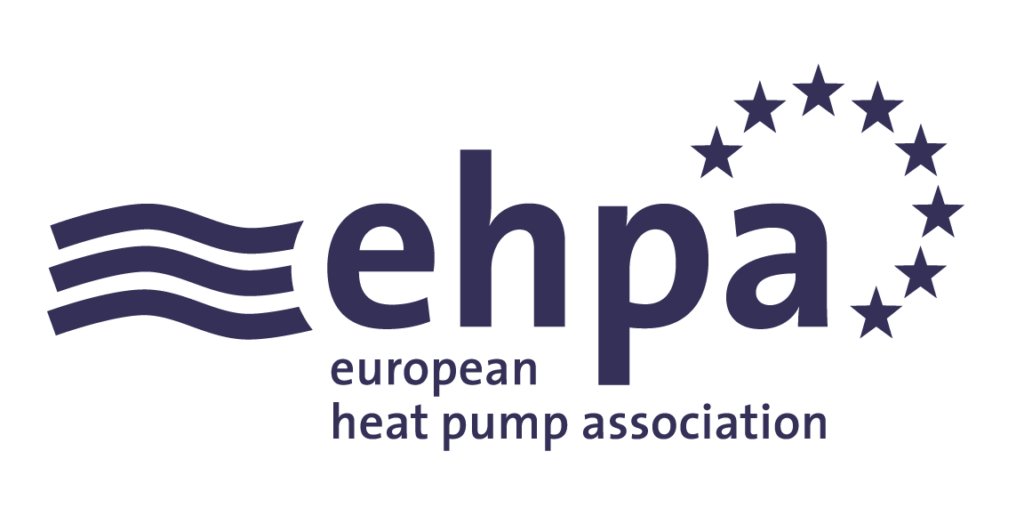Heat pumps are avoiding more gas and carbon dioxide emissions in Europe than ever, new calculations from the European Heat Pump Association (EHPA) show. Despite this, sales in the first half of 2024 are down 47% on the same time period last year.
The 24 million heat pumps currently installed in Europe avoid 5.5 billion cubic metres of gas. This is 1.6% of the EU’s total annual gas consumption.
The heat pumps are avoiding 45 megatonnes of carbon dioxide emissions in Europe every year, EHPA’s new data also reveals. This is around 4.9% of total EU emissions for buildings – and the same amount as Hungary’s annual output.
If the EU meets its 2030 ambition of 60 million installed heat pumps*, they will be avoiding 112 megatonnes of carbon dioxide emissions and 13.7 billion cubic metres of gas per year.
Despite these benefits, just 765,000 heat pumps were sold in 13 European countries** in the first half of 2024 – 47% less than the 1.44 million heat pumps sold in those same countries in first half 2023.
This is mainly due to changing national policies and support schemes for consumers and low gas prices, while electricity prices are coming down more slowly.
Paul Kenny, Director General of the European Heat Pump Association said:
“There’s no future in fossil fuels – on economic, geopolitical or climate grounds. Both to ensure Europe’s long-term competitiveness and to eliminate coal, oil and gas in the heating and cooling sector we need to reverse the slowing heat pump market urgently.
“The new EU Commission should publish the long-awaited EU Heat Pump Action Plan, ensuring it supports manufacturing and training. What’s more, offering flexible electricity tariffs so households and businesses with heat pumps can choose to use power when it costs less, which would be good for consumers and the grid,” added Kenny.
Most gas is avoided by installing a heat pump in Luxembourg, and least in Cyprus. As for the overall climate benefits of heat pumps, they are strongest in Austria (see graph below). This is due to energy and electricity mixes varying according to different countries
Alongside their contribution to decarbonisation, heat pumps are an important part of Europe’s clean tech leadership, with a strong and competitive domestic industry boasting nearly 300 manufacturing sites.
The European Heat Pump Association released the data to coincide with the opening day of its 2024 Heat Pump Forum in Brussels.



EHPA thanks the sponsors of the Heat Pump Forum 2024:

EHPA is partnering with Heat Pump Technologies

Further information:
*The figure of 60 million heat pumps by 2030 is included in the European Commission’s PRIMES energy modelling, for the 2040 climate target: https://publications.europa.eu/resource/cellar/6c154426-c5a6-11ee-95d9-01aa75ed71a1.0001.03/DOC_3
** Austria, Belgium, Denmark, Finland, France, Germany, Italy, Netherlands, Norway, Portugal, Spain, Sweden, Switzerland.
How we calculated CO2 and gas consumption avoidance with heat pumps
Earlier EHPA Market Reports contains higher gas-savings figures. These higher values are due to the assumption that each heat pump installed directly replaces a gas boiler (i.e. all displaced heat is attributed to gas).
However in the above analysis we built country-specific analysis of the impact of the replacement of an existing heating system by a heat pump per household, based on the following assumptions:
- The number of installed heat pumps corresponds to the last 20 years of sales data from EHPA (2023 backwards).
- One heat pump installed replaces present and past Final Consumption Energy mix for a household from 2022 (Space Heating and Water Heating combined). Including existing Ambient heat, accounting for replacement rate.
- A set of assumed values for CO2 emissions of different types of fuels, as well as efficiency for the same set of fuels accounting for the transition between Final Consumption Energy and Useful Energy
- The CO2 avoided for one household is the difference between the 2022 CO2 intensity of the mix for meeting the average heating needs less the grid CO2 intensity in a country for powering a heat pump in replacement.
- The gas savings are calculated in the same manner as CO2 avoidance. Accounting for in addition the gas used for electricity generation that will be used by the heat pump in replacement of the FEC mix (uses gas directly as a mode of heating, also though electricity generation).
- Sales from EHPA are used to replace a resulting per-household CO2 and gas output. UK and Switzerland are assumed to share the average final consumption mix of EU-27, as entries for these two countries are unavailable in Eurostat datasets.
The figures on energy used in households across Europe are from Eurostat: Energy Balances, Disaggregated final energy consumption in households – quantities.
We took from this dataset the average Final Consumption mix for Space Heating and Water Heating (Residential) per household, combined with the electricity generation mix for each country and the greenhouse gas emissions intensity of the grid for countries in Europe.



